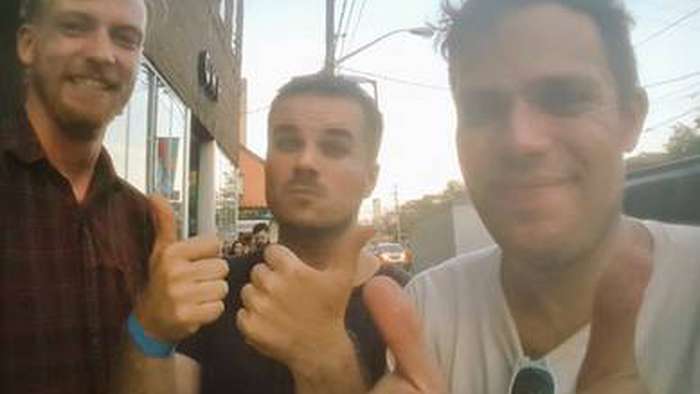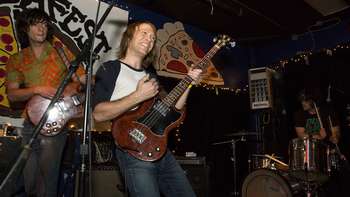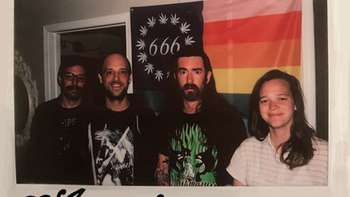I’m not getting paid to write this article. This isn’t meant at as a shot at Scene Point Blank. The editors for this site are long time friends. They gave me a staff position over a decade ago when I was still a teenager and I’m forever grateful for that opportunity. The majority of us who have worked at Scene Point Blank met on a punk rock message board. The site was birthed as an extension of the zine culture that permeated our local scenes. We wrote because we loved music. We wrote because writing would get us advanced copies of promo CDs. Occasionally it’d even give us the opportunity to talk to our favorite bands. Punk rock was important and the site was punk rock.
At its height Scene Point Blank received 30,000 unique hits a month. I remember seeing those numbers for the first time. The idea that 30,000 people cared what my friends and I thought about music seemed insane. It never occurred to me that anyone would give us money for these opinions and even at its height the site has never been large enough to pay its contributors. That didn’t matter to me. It wasn’t the point. I wrote about music because I wanted to share opinions with an audience. At the time knowing that people were reading what I wrote was enough.
Earlier this year I turned twenty-eight years-old. The majority of friends who went to shows have moved on to other things. People who wrote articles stopped and got real jobs. Some have starter homes and serious partners. Some have positions where they wear suits. There are even a few with kids. When looking at my peer group, I get embarrassed that I still spend my evenings and weekends writing free articles and interviewing mid-level musicians. A (recent) ex-girlfriend once remarked that my hobby wasn’t going to be charming forever. I think about that statement a lot. At this point of my life wasn’t I supposed to have done more? Shouldn’t I be making more money? Shouldn’t I have more than what I’ve got now? On a surface level the answer to all of these questions is an easy and definite yes. But when I think about it more things become complicated. Writing about bands is one of the only things I actually like doing but lately with the external pressures to grow up I’ve been wondering if liking something is a good enough reason to keep doing it. Especially if everyone else tells you the thing you love is dumb. These were the thoughts I was dealing with while prepping for my interview with Jeff Rosenstock.
Last year Rosenstock’s album Worry dealt with a lot of these issues in a succinct, humorous, and heartbreaking fashion. The album was a critical darling covering gentrification, growing up, and holding on. While among certain circles Rosenstock had already achieved cult status for his time spent fronting the ska/punk act Bomb the Music Industry, Worry raised his profile significantly. Suddenly there were more journalists asking for interviews. People were heralding his DIY ethos -- for years all of Rosenstock’s music was given away through pay-what-you-want downloads on his website or simply releasing the music for free -- as the vanguard to how bigger acts are distributing music today. They were starting to discuss his lyrics alongside heavy hitters like Okkervil River and Conor Oberst. After years of work, people were finally giving Rosenstock some much deserved credit but, despite all this, he was still playing 200-seat rooms across the country. Looking at Rosenstock’s situation and pouring over his lyrics I made the decision (as I often do) to drop all of my existential terror onto an artist I enjoy with the hopes that maybe he’d have the answers I was looking for. You can read our conversation below:
Scene Point Blank: Thanks so much for taking the time to do the interview. Worry was my favorite record that last year. The album was written during a pretty tumultuous time period in your life. What were your expectations going into Worry and do you feel like you’ve met them?
Jeff Rosenstock: None of the records I write are really about good times at all. And the response to it? I don’t know it was like: oh fuck, people like this record? Okay. That’s cool. It’s really exciting and terrifying and fun. It’s nice. It’s nice that we get to play music. Does that answer your question? Probably not at all.
Scene Point Blank: It’s ballpark.
Jeff Rosenstock: I guess I had no expectations. I always just cross my fingers that people like it and if people don’t like it’s fine. That’s what I expected.
Scene Point Blank: You just mentioned the lyrics you write aren’t usually coming from a happy place. Does it ever feel weird to achieve success through digging into your own demons? People have made you an authority on depression.
Jeff Rosenstock: Oh, sure. I think it’s a big thing. FIrst of all: I don’t know anything. I can just find these hundred words to say about [depression and anxiety] in a song. That’s my clearest thought on the matter. Obviously you hope what you write means anything to anyone. But as far as authority? I don’t know anything beyond what I write. I’d just end up talking to people about this really sad stuff in interviews. I’d say all these definitive things. But I don’t know, man. I don’t know what your journey with depression is. I just know mine. Then, with Worry, not only did I end up talking about depression, but I’d end up talking about politics which I really know nothing about. I was just trying to offer my perspective.
Jeff Rosenstock: At the same time, I feel really lucky that the stuff that eats me up so much -- the stuff that eats me up and makes the day bad -- I’m happy that I have not only a productive place to put all that, but that it helps other people through. That’s really awesome. It’s like: wow. That’s really nice. I’ve been doing this for a really long time and it hasn’t always been that anyone has listened to anything that I’ve done. I really don’t take that for granted and I also know how important music is to me when I’m in those places. I’m not always great at articulating my feelings about my own struggle or my own success when I’m asked.
Scene Point Blank: I feel like most of it gets left in the songs.
Jeff Rosenstock: I always joke that in my songs I’m like: I’m terrified of talking to anybody! Don’t talk to me! And then I talk to people at shows and people are asking me questions like: so how many times have you tried to kill yourself?
Scene Point Blank: It might be because people build such an easy relationship with your lyrics that they feel like they already know you. Or maybe because you’ve been around the scene for long enough that people assume that you have some kind of answers. In the same way that people make you an authority on depression, I think they’ve also made you an authority on punk.
Jeff Rosenstock: WIth punk it often feels like I’m living inside someone else’s world because I’m just such a fucking fan. It’s meant everything to me from the time I was a teeenager until now. Even as the music I make gets further and further away from it. When people say those things about me all I can think about is Defiance, Ohio and Plan-It-X Records or Hot New Mexicans. I look up to people in that world a lot. I’ve been lucky enough to be friends with a handful of those people and ask them for advice. When people talk about me [as an authority]? I was just a weird nerd trying to make music because I was sad. I feel like punk deserves no authority on punk. I think that’s the whole fucking point. There is a little weirdness there. But I feel kind of weird about everything. You could ask me if I feel weird about anything and I’d be like uh huh.
Scene Point Blank: That covers maybe my next five questions.
Jeff Rosenstock: There is a lot of external conflict for no reason.
Scene Point Blank: Lately I’ve been using band interviews as an excuse to ask my favorite artists life advice. Lately I’ve been questioning whether or not the continued pursuit of art has fucked up my whole life. Do you feel like the continual pursuit of art has fucked up your whole life?
Jeff Rosenstock: I’ll let you know when I’m dead. I don’t know. I feel like that a lot of the time. But maybe it’s good? Maybe that keeps pushing me to find interesting ways to do stuff. Right now it seems like things are pretty decent for us. This is the most successful band I’ve ever had. Successful, meaning we can live off it right now. But it’s weird, you know? There is one end of it where you don’t have a home. You’re gone all the time. You’re kind of doing this thing that revolves around nightlife but at a certain point it’s not nightlife for you. If I didn’t want to self-destruct I needed to stop drinking so much every night before we play. Every night it’s like a party you’re at but sometimes the next day there is this weird emptiness. It’s like Slurms McKenzie in that episode of Futurama.
But on the other side of it? This is what we all want to do. It’s what we all wanted to do since we were young. I don’t think many people get to live their dreams. And just because dreams ended up not being fucking exactly how you dreamed them and you have to have a little bit of complicated feelings with them because we’re all emotionally complex human beings. It’s like whatever, you know? So, no, I don’t think I’ve fucked up my whole life. But I don’t know if I’m just throwing quicksand in front of it.
"I’m happy that I have not only a productive place to put all that, but that it helps other people through."
Scene Point Blank: I think that concern is exactly why I loved Worry so much. You’re bold in the face of a lot of those feelings, but there is still an underlying anxiety about not having some of the same things other people have in adulthood.
Jeff Rosenstock: Our generation is weird because things are fucked. You don’t need to go to college anymore. A lot of people just luck into bartending jobs or service industry jobs that can pay a lot while traditional jobs seem to be going away. But then you think if I’m a bartender forever does that mean I’m just a bartender? Is that a fine thing to do? Does that mean I’m fucking up my life? We were all sold this idea during a certain era of America where it seemed like more things were possible. Houses/cars. Now it seems like different things are possible. Where you can work a night job and hang out during the day and you can pay your bills totally fine. That doesn’t make you some weird miscreant. Things are different.
So you think about adulthood and you ask: when am I supposed to have a kid? When am I supposed to buy a house? When am I supposed to do any of that shit. If you live in a city buying a house, having a kid, hell even having a dog. None of that shit ever seems possible. So it can be confusing to see other people do that. Even if it’s just on TV. But there is nothing wrong with being a little slow to that stuff. There is nothing wrong with not doing it. You can stop and enjoy things. There isn’t a schedule you’re supposed to have your life on. But again, what do I know? I’ll go to a therapist and figure it out if I ever get time.
Scene Point Blank: I was secretly hoping you’d have all the answers.
Jeff Rosenstock: We’ve all got to make answers for ourselves, I guess.
Scene Point Blank: We’ll wrap on this idea. A lot of people have talked about how you were on the forefront of artists giving away their music for free. When you look at your bank account now or you look at peers who’ve been able better provide for themselves with their art are there any reservations? Was it worth it to do everything for so little financial return?
Jeff Rosenstock: There are no reservations about giving away everything for free. I wish we would have been able to do it for longer. I wish we would have been able to tour with no merch for the entire time we were in Bomb the Music Industry. That would have made it really hard, but I don’t know. The way it was going? You just trust that people would support it if they loved it [through donations]. And if they couldn’t afford to support it that day that they’d get you back later on. I liked doing it that way. I think doing it that way was the reason why people heard of me in the first place. It works itself out.
Scene Point Blank: So you don’t grow out of punk?
Jeff Rosenstock: Punk is in everything I’ve done. It’s in my heart. It’s affected normal jobs I’ve had. When I worked in an office I tried to work hard and have good energy. I tried to make it as positive a space as I can all of the time. And it’s up to you to do that. That’s what I learned from punk.








